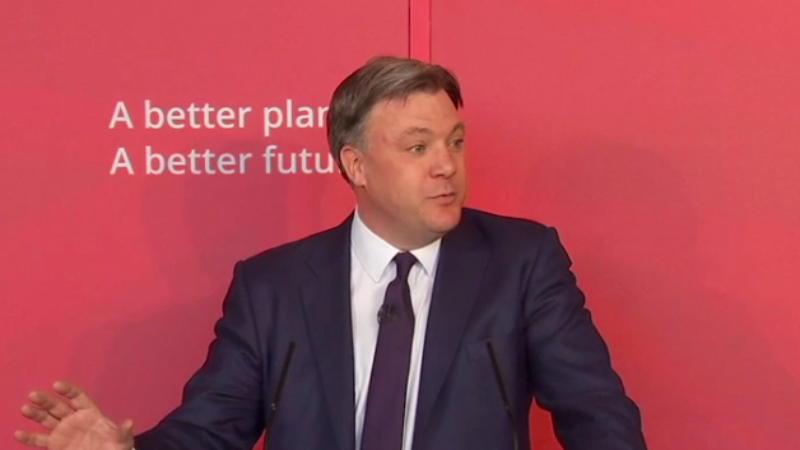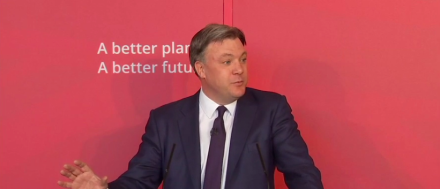

There will be cuts. Fewer under Labour than the Tories or the LibDems. Prudently perhaps, all four main parties have given an ‘incomplete picture’ of their spending plans after May, as the Institute of Fiscal Studies notes. But we know an Ed Miliband cabinet will stick to the coalition’s current spending plans, and will cut areas outside health, overseas aid and education to get borrowing down. The Tories, if we lose in two weeks time, will cut public spending bigger and worse. They’ll do that while cutting taxes. It’ll be nasty. But if Britain is in a state of austerity now, a Labour government will indeed preside over ‘austerity with a red rosette’.
But if this is austerity, there is no serious anti-austerity party in Britain. Yesterday the IFS told us the SNP’s plans imply the same cuts as Labour. Nicola Sturgeon broke the first rule of politics on Newsnight last night: never argue with the IFS. In fact the SNP’s claims to be ‘anti-austerity’ are based on vague predictions about increased cash from cutting tax avoidance and economic growth. They’re not quite back to being Tartan Tories. But if the argument is about austerity, there’s nothing particularly socialist about the Scottish Nats.
But Sturgeon’s fake anti-austerity pitch shows the dead-end which left-wing rhetoric has boxed itself into. For too many on the left – too many even in the Labour party – political virtue is about the scale of public sector spending, as if the state is an intrinsically good thing. Too many MPs calibrate the scale of political success by the proportion of GDP spent on public services we could get away with. Too many have reduced politics to an accounting game. What matters is not how much you spend but what you spend it on and how it’s spent.
Labour’s historic role has not been to preside over large amounts of public spending. Our movement was built to organise working people (aka hard working families) to challenge the otherwise unfettered power of big corporations. It was founded by frugal men and women, few of whom had much desire to increase the number of public sector employees.
As I’ve been arguing in this column, our aim now should be to further the practical freedom of ordinary people. Labour idea of liberty starts with the fact we have free will but are always also dependent on others. Public services are a vital part of the support we need to flourish, but they provide it in many different ways which we need to debate, and the never provide it on their own.
The argument about austerity reduces our understanding of the conditions we need to thrive to a single set of big numbers that mean nothing on their own. The obsession with the deficit means we’ve seen too little debate about what Aditya Chakrabortty calls the big existential questions in this election campaign.
Our kind of politics – lets call it socialism – shouldn’t be about whether public expenditure is 40% or 36% of GDP. It’s about what, practically, will make sure we have good jobs, decent homes, quality healthcare and neighbourhoods where we look after each other. Where are those jobs going to come from? What are politicians going to do to help businesses look to the long term, train and employ people with high skills and pay a wage workers can do more than live on? Where is the badly needed money going to come from to invest in real, productive private sector growth? As Aditya argues, talk of government spending that doesn’t answer these questions isn’t economics, it’s accountancy. Our story shouldn’t only be about balancing the books but creating real economic growth.
If Labour wins next month, money will be tight. But our vision of socialism isn’t about high levels of public expenditure for its own sake. It should be about creating institutions, whether technical training colleges or universities, good hospitals or local business banks, cooperative housing projects and community land trusts, which support our economy and help people to thrive on their own terms. It should be an effort to make sure the voice of workers and consumers has to be heard in the management of our biggest firms. Socialism is about building collective institutions that create a more long-term and more equal society. Paradoxically, it wants to civilise capitalism so it can better survive the next economic crisis.
If we win, Labour will spend more than the Conservatives – and borrow more in the short-term – because we believe economic growth depends on investment. Unlike the Tories, we don’t just think it’s about unleashing the animal spirits of rich bankers to create wealth that somehow magically trickles down to the poor (it doesn’t). We need to expose the myth of right-wing anti-statism. As a proportion of GDP, welfare payments were higher under the Tories in the 1980s than under the Labour government’s before or (before 2008) after. In reality, the right’s vision of a society of unsupported individuals ends up needing to fund a bigger welfare state.
But unlike the far left, we shouldn’t imagine that public spending is a good in itself. In power, Labour needs to be hard-headed ensuring public money is effective. The best way to do that is hand it to bodies where spending is properly held to account, in most cases as far from Whitehall as possible. A Labour government needs to be clear: the purpose of government is not to tax and redistribute, but to invest and support. It makes sure those in need are cared for well. But it then focuses on what needs to be done to nurture growth. An economy reliant on public sector hand-outs is not a success on anyone’s terms. Ultimately, the job of politicians is to ensure the economy not government is the source of a livelihood for most.




More from LabourList
Government abandons plans to delay 30 local elections in England
‘The cost of living crisis is still Britain’s defining political challenge’
‘Nurses are finally getting the recognition they deserve’